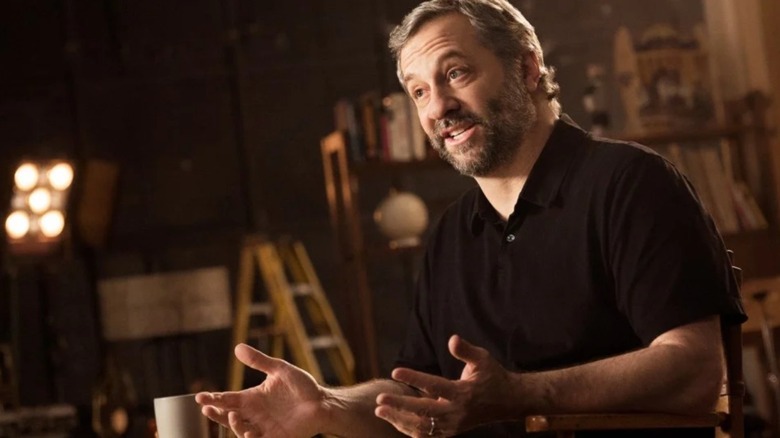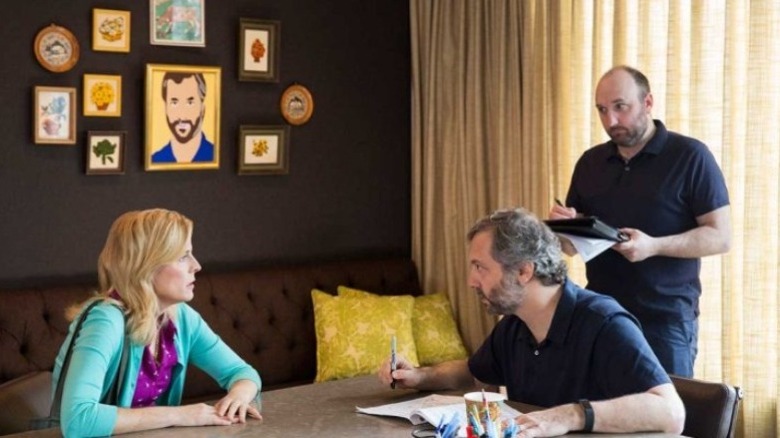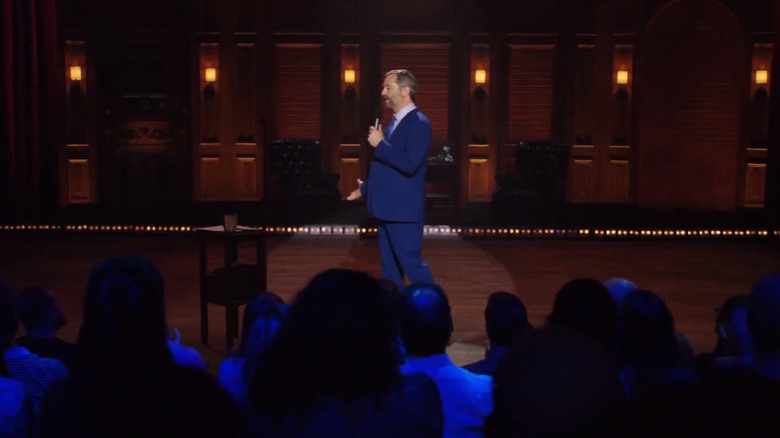The Writers Strike Presents An 'Existential Problem' For The Film Industry, Judd Apatow Says
On Tuesday, May 2, 2023, talks between the Writers Guild of America and the Alliance of Motion Picture and Television Producers fell apart over issues pertaining to, among other things, the paltry residuals writers get for streaming revenue. The WGA said in a statement that pay had become so low that the AMPTP had essentially created "a gig economy inside a union work force." The WGA was also concerted with the disturbing, and very real possibility that authors could ostensibly be replaced by studio-owned AI programs.
The writers' strike took effect at 12:01 a.m. and, as of this writing, is still in effect. Production on several high-end TV shows has already ceased as a result.
Negotiations for better wages and higher job security are, it seems, not terribly complicated. According to filmmaker Judd Apatow, who recently spoke with Variety, the strike isn't about bureaucratic details or untangling complex legalese, but a mere game of chicken being played by the studios. Apatow has intuited that, for the producers, the strike is little more than a protracted bargaining chip. Apatow seems to think that the producers can — and will — end the strike at any time, and have been looking at the entire enterprise as a matter of crunching numbers, saving cash, and paying out when they feel they can afford it. Apatow also thinks it's going to go on a long time.
For context, the writers' strike of 1988, the longest in the organization's history, lasted 153 days. The 2008 strike lasted 100 days.
'That's why it's an existential problem'
Apatow was succinct, saying:
"I always think that whatever happens, they could have figured it out already. When these things conclude, you never go, 'I understand why it took that long.' It's never something so inventive, and groundbreaking, that you think, 'Oh, people needed to go to war for months over it.' It's always a very obvious position. [...] So that's what's scary about it is that there is a solution, but I'm not sure that all of the business interests are interested in getting to it quickly."
Apatow hopes that the strike will reveal to beancounters the actual importance of writers in the creative ecosystem of Hollywood. He compares Hollywood to the recent kerfuffle at Twitter, wherein an inexperienced new CEO moved in and, as a cost-saving measure, laid off a great deal of the company's staff, deeming them redundant. He feels that the Alliance of Motion Picture and Television Producers (also known as the AMPTP) would happily lay off its workers if it could, all in the name of saving money. Apatow feels, however, that doing so would drive people away from the business altogether. If writers aren't being paid, the incentive to become a professional goes away. The writer/director/producer believes that online fame would be pursued instead. In his words:
"That's why it's an existential problem. If the ecosystem of writers doesn't exist, no one will learn how to do it. No one will be able to survive doing it. And then everyone will go, 'Well, maybe I'll write video games, maybe I'll make TikToks at home and become an influencer.' It's a lot of creative people who can do other things. So you don't want the whole system to collapse."
Apatow's daughter, Maude, is something of a TikTok celebrity already, so he's seen it in action.
It's not about greed
Apatow lays out this future, of course, as a mere possible outcome of an industry working at extremes. None of the picketing writers has said they will leave the business and become a TikTok influencer instead (at least not publicly), and Apatow wasn't suggesting that they should. The writer of "The 40-Year-Old Virgin" and "This is 40" was merely concerned for an environment where writing is no longer valued as a craft. If a mega-hit will net a writer the same small payment as a bomb, there is less incentive to try. This seems to be the case with major streaming services. Apatow said:
"We have a system now that does not reward success for a lot of these projects. [...] If you make something and a billion people watch it, you don't make more money than if it was a disaster, right? That's not good for creativity because it takes away a lot of the motivation for the creative people, because people work really hard to create some sort of cushion for their lives."
Success, Apatow added, should be a fortunate side effect of writing, and the old model — of living off residuals while writing the next project — was preferable to a model where there were no residuals at all.
"All of our work is ebb and flow. The successes pay for the time when things aren't going well. Sometimes they go well and sometimes they don't, but you can live off of the time that you wrote something that had a lot of residual [fees paid out]. It's always been a tenuous career. But if you take away most of the linchpins, it's a career that a majority people can't survive."


